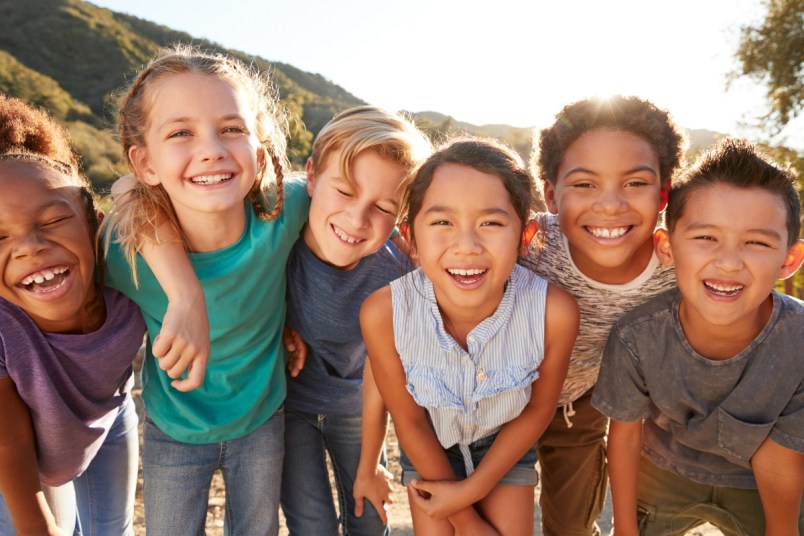America Parents Differently Than Other Countries — Should We Shift Our Priorities?
From Finland to England, Korea to Spain, parenting styles vary.

Late bedtimes? No kids’ menu? Parenting strategies change depending on where you look. In Japan, for example, kids as young as age 4 will take the subway or run errands alone as a way to build independence. If a person in the US saw a 4-year-old alone on a subway, their immediate reaction would be alarm. Consider what these 12 cultures offer when it comes to child-rearing philosophies — and how they might educate your own approach.
In Sweden, kids have say so.
Mother isn’t always right here. Families are considered very egalitarian, with parents and kids having equal rights. Instead of Mom and Dad ruling the roost and calling the shots, children are expected and encouraged to share their opinions and help make family decisions.
In Finland, schooldays are short and varied.
Universal pre-K has been a hot topic at home, but in Finland, kids don’t begin formal schooling until they are 7 years old. School days are much shorter too, sometimes as little as four hours, plus students get plenty of breaks, as frequently as every 45 minutes, for outdoor time. Also, it’s not just reading, ’riting and ’rithmetic — there’s a wide range of electives and classes, with an emphasis on the arts, music, life skills, and home economics. The result? Finland has what’s widely considered to be one of the best education systems in the world.
In Mexico, appearance gets a grade.
You might be hard-pressed to find unruly looking little ones south of the border. Grooming is taken seriously in Mexico, so much so that if students show up to school looking unkempt — if their hair isn’t combed or it doesn’t have enough styling product to look neat — they’ll be sent home from school with a note for their parents. Essentially, they’re graded on their upkeep too, since report cards include marks specifically for personal hygiene.
In Denmark, babies are ok by themselves.
While this would probably earn you a visit from child protective services in the United States, it’s a common practice for Danish parents to park their children’s strollers on the sidewalk — with the babies still inside, typically sound asleep — while they go inside a restaurant for dinner or browse a boutique. It might be hard for American parents to wrap their heads around the idea of leaving your little one outside, all alone and unattended; but in Denmark, parents believe that it’s important for kids to get fresh air.
In Korea, kids’ menus don’t exist.
Having the right snacks on hand for your kids is practically part of an American parent’s job. But in Korea, people are not fans of nibbling throughout the day. There, parents take teaching kids to eat seriously. Lesson No. 1: fighting hunger until it’s time for the family to eat together. And forget the kids’ menu: Korean children eat the same meals as adults do.
In Chile, candy from strangers is fine.
From a young age, American kids are taught never to take candy — or anything else for that matter — from strangers. But in Chile, giving sweets to children is a sign of affection. And if parents refuse candy offered by strangers on the street, they will be chided by onlookers for depriving their kids.
In England, bragging on your kids is bad.
From posting about winning science projects on social media to gushing about soccer trophies around the office, Americans are known for boasting about their kids. But in the UK, this behavior is looked down upon. Forget bragging — they can’t even talk about their children’s accomplishments; the same goes for kids tooting their own horns. Instead, parents often make deprecating comments in front of their kids to teach them to be humble.
In the Polynesian Islands, babysitting starts early.
Babysitting gigs start at a much earlier age here. Adults are in charge of caring for infants, but as soon as children are able to walk, other kids quickly become responsible for their siblings and neighbors. As a result, toddlers in the Polynesian Islands are much more independent than their stateside counterparts, knowing that it’s the only way they can spend time with older kids.
In Brazil, extended family help out — a lot.
Here, raising kids doesn’t fall only on Mom and Dad. It’s very common for several generations of a family — from grandparents to cousins to siblings — to live together on different floors of the same building or in adjoining homes. That’s convenient for the tradition of encouraging extended family to help bring up the children.
In Spain, kids stay up late.
Having a strict, regular bedtime is often seen as a smart parenting strategy in the US. That’s not the case in Spain, where parents often won’t tuck in little ones until 10 p.m. or later. That’s because mothers and fathers find it important that even young kids enjoy the family’s nightlife.
In France, kids don’t interrupt.
Maman and Papa believe that developing a sophisticated palate starts as soon as kids begin eating solids. Their little ones are also famous for minding their manners. From a young age, they’re taught never to interrupt, and parents relay that lesson — they lead by example. Patience is key, so instead of dropping everything to tend to their kids — as Americans often do — children must wait until Mom and Dad are done with their business first.
A version of this article appeared in our partner magazine The Science of Raising Happy Kids.












